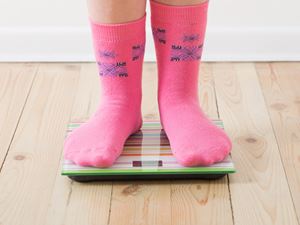
It is no secret that many teens struggle with their body image when they hit puberty. There are a growing number of girls starting at the age of 10 who have dieted and are dieting. By the time they become 13 an estimated 53 percent of American girls admitted being unhappy with their bodies. The number jumped to 78 percent by the time teens reached the age of 17. With social media, commercials, movies, television, teen magazines and other media platforms, there is no doubt that creating a healthy body image is a tough battle. You are not only dealing with the media, but dealing with hormones and peer pressure. Kids at this age are hyperaware of what they look like with every blemish becoming monumental. They are dealing with floods of emotions and hormones. Honestly it will be a trying time. Strap yourself in dear parents--there is good news. You have an influence on your kid’s life and future. Here are 6 ways you can help your teen develop a healthy body image.
Be an example.
Ok, momma. Your teen is watching how you eat and your attitude about your own body. If you are always critiquing your looks--they will pick up on this negativity. Model good habits like exercising and making positive changes like eating healthier. Positive self-talk is another thing kids pick up. We all have bad body days--you can still comment that you look good and feel great. If they hear this positive script they can handle negative thoughts about themselves better. The same holds true about dieting, if they see you obsessed with thinness, they will mirror this back. Be mindful that if you have a healthy attitude, your teen will too.
Compliment them.
Share and show your kids that there is more to life than what you look like. Compliment them that they look great in their outfit. Also compliment them on personal attributes like kindness, values, their smile, math skills and how they are a good sibling. The goal is to build self-worth based on other important attributes, because in reality looks fade, but character is forever. This teaches them to compliment people and to value people no matter what they look like. Teens never really listen initially, but you are building a foundation and making a difference on their value system.
Encourage exercise as a way of life.
Emphasize being healthy overall is the best way to live and to have fun. Go biking, swimming, dancing, yoga and engage in other physical activities that promote a healthy lifestyle. Invite them to exercise with you by taking walks or playing sports. Help them find a sport that they like. Sports will help teach about teamwork and help in creating healthy goals. The Better Health Channel recommended avoiding sports where kids need to maintain thinness like ballet. Kids who are vulnerable could feel pressure to lose weight. Work with your teen to find an activity that they can enjoy and where they can build up their confidence.
Tell them the truth.
Teens are going to compare themselves to airbrushed models. You need to stress to them that it is false and not real. These “ideal images” can be toxic to kids wanting to be ultra-thin. The prefect complexion is never attainable outside a makeup studio and computer touchups. Even celebrities are tired of the lies portrayed by these false images. Stars like Demi Lovato, Taylor Swift, Rihanna and Jennifer Lawrence are outspoken about allowing the media to dictate what you should look like. They urged girls to not cave into the pressure and to be themselves. Everyone has something they don’t like about themselves. Let teens know they are not alone in these struggles. Tell them to question what they hear and see in the media.
Open up the lines of communication.
Have a discussion about body image with your teen. Share with them that everyone’s body is different and shapes vary. Explain that people grow differently and their bodies go through changes during puberty. Ask what they like about themselves and share what you love about them as well. Enlist your family physician to “help set realistic goals for BMI and weight based on her personal weight history and overall health,” the Mayo Clinic suggested if their weight is troubling them. You want to create a non-threatening environment and be someone that your teen trusts. Being an ever steady presence in their lives is pivotal to their self-esteem and future.
Share the negative impacts.
A negative body image can have a lasting impact on your teen that includes depression and anxiety. It pushes them to an extreme by crash dieting or pushing for cosmetic surgery to change their appearance. It may affect "comfort with sexuality, and with her sexuality or reproductive body functions, such as menstruation or breast-feeding, as she gets older," Web MD reported. Nipping a poor body image in the beginning could prevent problems in the long run. If you need help talk to the pediatrician or a counselor on how to keep tabs on any negative patterns.
There is your crash course in providing guidance for your teen as they navigate through this tricky and sensitive time. You might not have all the answers, but as you go through these experiences together, you both will be stretched. Overall, we can’t stop the images of what perfection is supposed to be. However, we can combat its insidious influences over our kids. You need to know that there are no perfect parents, so let yourself off the hook as well. We are all figuring parenting out together and we will make mistakes. During this process of boosting your teen’s self-esteem, boost your own. Tell yourself that you are a good parent and the fact you are working so hard at it is a testimony of your own character. Hang in there mom or dad, you are making a difference.

